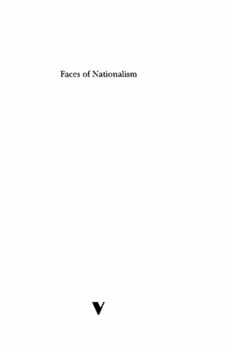
Faces of Nationalism: Janus Revisited PDF
Preview Faces of Nationalism: Janus Revisited
Faces of Nationalism Faces of Nationalism Janus Revisited ————_@—__———_- TOM NAIRN v VERSO London - New York First published by Verso 1997 © Tom Nairn All rights reserved The right of Tom Naim to be identified as the author of this work has been asserted by him in accordance with the Copyright, Designs and Patents Act 1988 Verso UK: 6 Meard Street, London W1V 3HR USA: 180 Varick Street, New York NY 10014-4606 Verso is the imprint of New Left Books ISBN 1-85984-823-0 ISBN 1-85984-194-5 (pbk) British Library Cataloguing in Publication Data A catalogue record for this book is available from the British Library Library of Congress Cataloging-in-Publication Data ‘A catalog record for this book is available from the Library of Congress Typeset by SetSystems Ltd, Saffron Walden, Essex Printed by Biddles Ltd, Guildford and King’s Lynn Millicent: Love, touch my heart with who you are And sleep, history, sleep. Contents PREFACE ix Introduction: On Studying Nationalism Part 1 The Internationale Questions of Rootedness 21 1 Internationalism: A Critique 25 2 The Owl of Minerva 47 3 Demonising Nationality 57 Part II Faces of Nationalism The Modern Janus 7 4 From Civil Society to Civic Nationalism: Evolutions of a Myth 73 5 The Curse of Rurality: Limits of Modernisation Theory 90 6 Race and Nationalism 113 Cities and Nationalism 122 Part III The Small Battalions The Question of Scale 133 8 Andorra 135 Vii viii CONTENTS 9 Micro-states 143 10 A Civic-Nationalist Divorce: Czechs and Slovaks 150 11 Ulster 157 12 Palestine 167 Part IV Scotland The Question of Scotland 179 13 Identities in Scotland 183 14 Empire and Union 194 15 Sovereignty After the Election 210 NOTES 225 INDEX 239 Preface The essays in this volume were written over a period of nearly eighteen years, too long and too varied a time for all of the author’s real acknowl- edgements and thanks to be expressed. He has to confine himself to relatively recent events and people. Chief among these must be David McCrone of Edinburgh University’s Sociology Department, who encouraged a belated return to academic life in 1993-94 and helped set up a course for the study of nationalism at the Graduate School in Social Sciences. Others who helped in the initiative include Neil McCormick, the former Provost of the University’s Faculty of Law and Social Science; his successor in this post, Professor Anthony Cohen; and Professor Malcolm Anderson of the Inter- national Social Science Institute. All four belong to a group of like-minded teachers at Edinburgh which has since the 1970s wholly changed the approach to this area of study. It includes Lindsay Paterson and Alice Brown, as well as a growing number of younger scholars and researchers grouped around them. The way for its formation was partly prepared in the 1970s and the early 1980s by Henry Drucker, a co-founder of the Unit for the Study of Government in Scotland (who has also assisted me more personally in recent times). Thanks to this broad community of thought something of the former spirit of Scottish Enlightenment returned before the Edinburgh Parliament did, and I have been fortunate enough to benefit from its influence. Another community which played a part in the book’s genesis was the shorter-lived one formed around Emest Gellner, in the city of Prague. He returned there to set up his Centre for the Study of Nationalism, in the former Prague College of the Central European University. But that project endured for all too short a time. Together with the assorted political and financial problems afflicting the College, his sudden death in November 1995 ended what could have become the principal centre for research and publication in the subject. An abiding sadness at this loss is qualified (but not much) by gratitude for my luck in being there during the academic year 1993-94, and learning so much. Among the Prague friends it is a particular pleasure to mention were Ernest’s assistants Robin Cassells and Gaye Wool- ven, and scholars like Sukumar Periwal, Peter Pithart and John A. Hall. ix x PREFACE As anyone can see from various items in the book, acknowledgement is also due to a much more enduring thought community associated with the New Left Review and its publishing house Verso. So far it has survived everything history has thrown at it: the expiry of 1960s hopes, the end of both empire and the Cold War, and the collapse (or identity change) of both communism and Western social democracy. Robin Blackburn’s per- sonal help brought the volume to its present state, as did suggestions and encouragement from other Verso authors like Benedict and Perry Ander- son. Since 1995, I have also been fortunate enough to receive very useful assistance from Geoff Mulgan and his colleagues at Demos. Anthony Barnett has encouraged and invigilated this production in his inimitable way, from both sides of the Atlantic. A similarly constant influence has been that of Jean-Francois Revel, the miglior fabbro of most of what I have written since the 1960s. And as I mentioned before, there have been simply too many other inputs to list or acknowledge properly for such a volume, notably from Neal Ascherson, Willie Storrar, John Osmond, Willie Thompson and Jean McNicol of the London Review of Books. A number of the essays first appeared there, and I am very grateful for the sustained support and interest of the London Review: editor Mary-Kay Wilmers’ is another of those indispensable communities of thought to which I have belonged since 1994. Thanks to Jim Singh-Sandhu I became a Visiting Professor at the University of Northumbria in 1997. I am also grateful to Jim, Monica Shaw, Bill Lancaster and David Welsh for letting me learn something of the republic- to-be in the north-east of England. Work on the book was concluded in an older Republic, under the welcoming eaves of Henk Van Kerkwijk’s home in Roscommon. Kilmore, Ireland, 1997
